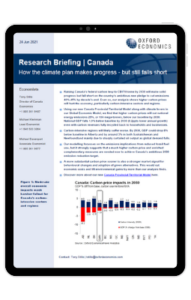Research Briefing
| Jun 24, 2021
Canada | How the climate plan makes progress – but still falls short

Raising Canada’s federal carbon levy to C$170/tonne by 2030 will make solid progress but fall short on the country’s ambitious new pledge to cut emissions 40%-45% by decade’s end. Even so, our analysis shows higher carbon prices will hurt the economy, particularly carbon-intensive sectors and regions.
What you will learn:
- Using our new Canada Provincial Territorial Model along with climate levers in our Global Economic Model, we find that higher carbon prices will cut national energy emissions 25%, or 136 mega-tonnes, below our baseline by 2030.
- Carbon-intensive regions will likely suffer worse. By 2030, GDP could drop 8% below baseline in Alberta and by around 3% in both Saskatchewan and Newfoundland mainly due to sharply curtailed oil output as global demand falls.
- Our modelling focusses on the emissions implications from reduced fossil fuel use, but it strongly suggests that a much higher carbon price and enriched complementary measures are needed now to achieve Canada’s ambitious 2030 emission reduction target.
Tags:
Related Services

Post
US Key Themes 2026: Exceptionalism amid fragmentation
US exceptionalism is alive and well, and that won't change in 2026.
Find Out More
Post
Global Key themes 2026: Bullish on US despite AI bubble fears
We anticipate another year of broadly steady and unexceptional global GDP growth, but with some more interesting stories running below the surface.
Find Out More[autopilot_shortcode]
